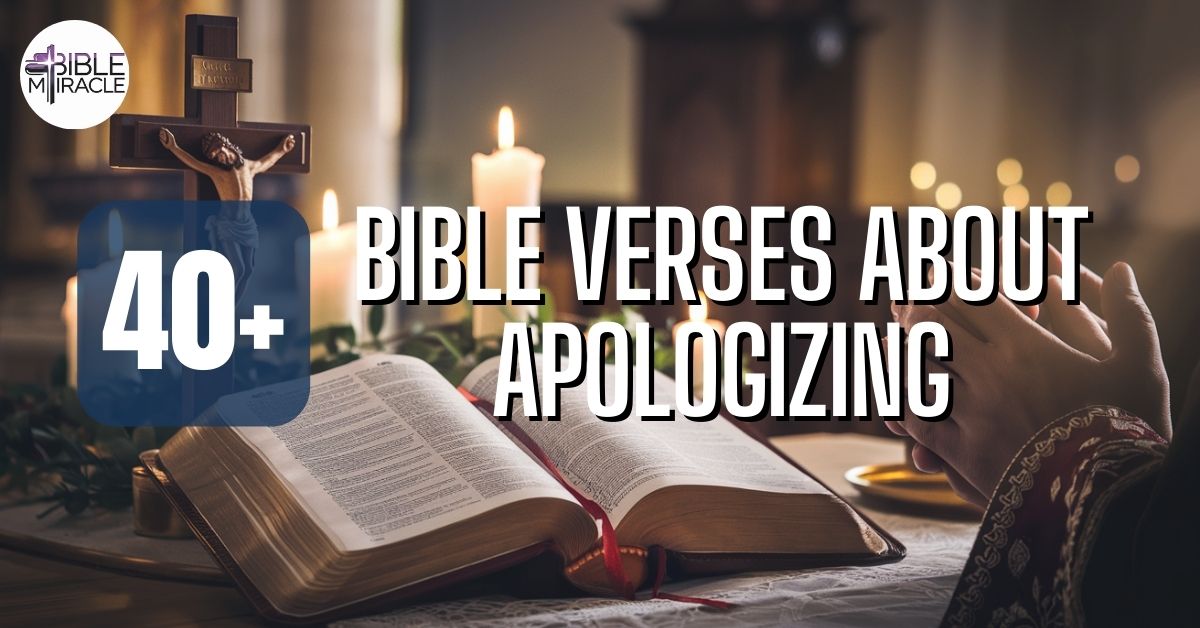Apologizing is a powerful act of humility and restoration. Bible verses about apologizing remind us that seeking forgiveness reflects a heart aligned with God’s grace. These scriptures provide wisdom, encouragement, and strength to help believers mend relationships and grow spiritually. While the Bible may not use the exact word “apology,” it emphasizes repentance, forgiveness, and making amends as key aspects of faith.
This article shares meaningful Bible verses about apologizing to guide you in expressing remorse and seeking reconciliation. Each verse highlights God’s desire for unity, love, and humility in our daily interactions. As you reflect on these scriptures, let them inspire you to embrace a heart of forgiveness and peace.
What Does the Bible Say About Apologizing?
The Bible teaches that apologizing is an essential part of repentance and reconciliation. James 5:16 states, “Therefore confess your sins to each other and pray for each other so that you may be healed.” This verse emphasizes that admitting wrongdoing and seeking forgiveness brings spiritual and emotional healing.
Apologizing with sincerity shows humility and aligns with God’s command to love one another. Ignoring the need to make amends can create division, while a heartfelt apology strengthens relationships and reflects Christ’s love.
A powerful biblical example is the story of Joseph and his brothers in Genesis 50:15-21. After selling Joseph into slavery, his brothers feared he would seek revenge. Instead, Joseph forgave them, saying, “You intended to harm me, but God intended it for good.” Though they wronged him deeply, their regret led to reconciliation. This story shows that an apology, combined with true repentance, can restore even the most broken relationships, demonstrating God’s grace in action.
How Do You Biblically Apologize to Someone?
A biblical apology requires humility, honesty, and a genuine desire for reconciliation. The Bible teaches that true repentance involves acknowledging wrongdoing and seeking forgiveness with a sincere heart. In Matthew 5:23-24, Jesus instructs, “If you are offering your gift at the altar and there remember that your brother or sister has something against you, leave your gift there in front of the altar. First go and be reconciled to them; then come and offer your gift.” This emphasizes the importance of making things right with others before seeking God’s presence.
For example, if a person gossips about a friend and later realizes their mistake, a biblical apology would involve confessing the wrongdoing, expressing genuine regret, and seeking reconciliation. Simply saying “sorry” is not enough; one must also work to rebuild trust and avoid repeating the mistake. True repentance leads to restored relationships and peace, aligning with God’s desire for unity among His people.
What Does the Bible Say About Apologetic?
The Bible encourages believers to be prepared to defend their faith with wisdom and gentleness. 1 Peter 3:15 states, “But in your hearts revere Christ as Lord. Always be prepared to give an answer to everyone who asks you to give the reason for the hope that you have. But do this with gentleness and respect.” This verse highlights the importance of apologetics, which is not just about defending Christian beliefs but also about sharing the truth with love and humility.
For example, if someone questions a Christian’s faith, instead of arguing, the believer should respond with patience and scriptural support. When Jesus spoke to the woman at the well (John 4), He didn’t condemn her but gently revealed the truth. Apologetics should always reflect Christ’s love, showing others the truth of the Gospel in a way that draws them closer to God.
Where in the Bible Does It Say Sorry Needs Change?
True repentance requires a change in behavior, not just words. 2 Corinthians 7:10 states, “Godly sorrow brings repentance that leads to salvation and leaves no regret, but worldly sorrow brings death.” This verse explains that genuine remorse leads to transformation, while empty apologies without change are meaningless. Saying sorry is only the first step; real repentance is proven through actions.
For instance, if someone continually lies but apologizes each time without changing, their words lose meaning. However, Zacchaeus, the tax collector in Luke 19:8-9, showed true repentance by repaying those he wronged and giving to the poor. His actions confirmed his apology, demonstrating that biblical repentance always results in a changed heart and life.
40+ Bible Verses About Apologizing
Apologizing is a crucial step in healing relationships and restoring peace. The Bible teaches the importance of seeking forgiveness, showing humility, and making amends. These Bible verses about apologizing offer guidance on how to seek and give forgiveness with a sincere heart.
1. The Importance of Apologizing
Saying sorry is more than words; it reflects a heart willing to change. The Bible encourages believers to acknowledge their wrongs and seek reconciliation. These verses highlight why apologizing is essential for maintaining love and unity.
- Matthew 5:23-24 – “Therefore if you are offering your gift at the altar and there remember that your brother has something against you, leave your gift there in front of the altar. First, go and be reconciled to them; then come and offer your gift.”
This verse teaches that reconciliation is more important than religious rituals. Seeking forgiveness should be a priority before offering worship to God. - Luke 17:3-4 – “If your brother or sister sins against you, rebuke them; and if they repent, forgive them. Even if they sin against you seven times in a day and seven times come back to you saying ‘I repent,’ you must forgive them.”
Jesus emphasizes the importance of repeated forgiveness. True repentance should always be met with grace and mercy. - James 5:16 – “Therefore confess your sins to each other and pray for each other so that you may be healed. The prayer of a righteous person is powerful and effective.”
Confessing our wrongs strengthens relationships and brings spiritual healing. Apologizing is an act of humility that allows God’s grace to work in us. - Proverbs 28:13 – “Whoever conceals their sins does not prosper, but the one who confesses and renounces them finds mercy.”
Hiding sins only leads to more harm, but confessing them brings mercy and restoration. God values honesty and repentance. - 1 John 1:9 – “If we confess our sins, he is faithful and just and will forgive us our sins and purify us from all unrighteousness.”
God is always ready to forgive those who sincerely repent. Apologizing is a step toward spiritual cleansing and renewal.
Find Your Blessings: 40+ Important Bible Verses About The Beach
2. Humility in Apologizing
True apologies come from a humble heart. The Bible teaches that pride prevents reconciliation, but humility opens the door for healing. These verses remind us to put aside ego and seek peace.
- Philippians 2:3 – “Do nothing out of selfish ambition or vain conceit. Rather, in humility value others above yourselves.”
Pride can make apologizing difficult, but humility allows us to acknowledge our mistakes and make things right. - Colossians 3:12-13 – “Therefore, as God’s chosen people, holy and dearly loved, clothe yourselves with compassion, kindness, humility, gentleness and patience. Bear with each other and forgive one another if any of you has a grievance against someone.”
Humility leads to forgiveness and reconciliation. Apologizing with a kind heart brings healing. - Ephesians 4:2 – “Be completely humble and gentle; be patient, bearing with one another in love.”
A sincere apology requires humility and patience. God calls us to treat others with love and understanding. - Micah 6:8 – “He has shown you, O mortal, what is good. And what does the Lord require of you? To act justly and to love mercy and to walk humbly with your God.”
Living humbly before God includes seeking forgiveness and showing mercy to others. - Romans 12:16 – “Live in harmony with one another. Do not be proud but be willing to associate with people of low position. Do not be conceited.”
Pride disrupts peace, but humility brings people closer. A heartfelt apology fosters unity and love.
Find Your Blessings: 40+ Bible Verses About 50th Wedding Anniversary
3. God’s Forgiveness as an Example
God forgives us completely when we repent. His grace is the model we should follow when we apologize to others. These verses remind us of the depth of God’s mercy.
- Psalm 86:5 – “You, Lord, are forgiving and good, abounding in love to all who call to you.”
God’s forgiveness is available to everyone. We should extend the same grace when we apologize. - Isaiah 1:18 – “Come now, let us settle the matter, says the Lord. Though your sins are like scarlet, they shall be as white as snow.”
God’s forgiveness completely washes away sin. Our apologies should also reflect true change and repentance. - Matthew 6:14-15 – “For if you forgive other people when they sin against you, your heavenly Father will also forgive you. But if you do not forgive others their sins, your Father will not forgive your sins.”
God’s forgiveness is conditional on our willingness to forgive others. Apologizing is part of this cycle of grace. - Lamentations 3:22-23 – “Because of the Lord’s great love we are not consumed, for his compassions never fail. They are new every morning.”
God’s mercy is endless, reminding us that we can always seek forgiveness and start anew. - Titus 3:5 – “He saved us, not because of righteous things we had done, but because of his mercy.”
We don’t deserve forgiveness, yet God grants it freely. We should reflect this mercy when apologizing.
Find Your Blessings: 40+ Bible Verses About Travel (Explained)
4. The Power of Making Amends
Apologizing is only the beginning; making amends shows true repentance. The Bible encourages actions that demonstrate a change of heart.
- Luke 19:8 – “But Zacchaeus stood up and said to the Lord, ‘Look, Lord! Here and now I give half of my possessions to the poor, and if I have cheated anybody out of anything, I will pay back four times the amount.’”
True repentance is shown through action. Zacchaeus apologized and made amends to prove his sincerity. - Numbers 5:6-7 – “Any man or woman who wrongs another in any way and so is unfaithful to the Lord is guilty and must confess the sin they have committed. They must make full restitution for the wrong they have done.”
Apologizing is not enough; making amends restores trust and justice. - Matthew 3:8 – “Produce fruit in keeping with repentance.”
A true apology is backed by changed behavior and good deeds. - Proverbs 14:9 – “Fools mock at making amends for sin, but goodwill is found among the upright.”
A wise person understands the importance of making amends, while a fool dismisses the need for apology. - 2 Corinthians 7:10 – “Godly sorrow brings repentance that leads to salvation and leaves no regret, but worldly sorrow brings death.”
A true apology comes from godly sorrow, not just regret over consequences.
Find Your Blessings: 40+ Bible Verses About Deception In The Last Days
5. Apologizing Brings Peace
Apologizing restores harmony and strengthens relationships. The Bible teaches that seeking peace through repentance is essential for a godly life. These verses highlight how apologies bring reconciliation.
- Hebrews 12:14 – “Make every effort to live in peace with everyone and to be holy; without holiness, no one will see the Lord.”
Seeking peace includes apologizing when necessary. A heart that pursues peace reflects God’s love. - Proverbs 15:1 – “A gentle answer turns away wrath, but a harsh word stirs up anger.”
A sincere and humble apology can calm anger, while defensiveness only creates more conflict. - Romans 14:19 – “Let us therefore make every effort to do what leads to peace and to mutual edification.”
Apologizing fosters peace and helps build stronger relationships grounded in love and understanding. - Matthew 5:9 – “Blessed are the peacemakers, for they will be called children of God.”
Apologizing and seeking reconciliation make us true peacemakers in God’s eyes. - 1 Peter 3:11 – “They must turn from evil and do good; they must seek peace and pursue it.”
God commands us to actively pursue peace, which includes apologizing when we have wronged others.
Find Your Blessings: 40+ Bible Verses About Forgiveness In Marriage
6. The Role of Love in Apologizing
Love motivates genuine apologies. The Bible teaches that love covers offenses and restores broken bonds. These verses show that love and humility go hand in hand.
- 1 Corinthians 13:4-5 – “Love is patient, love is kind. It does not envy, it does not boast, it is not proud. It does not dishonor others, it is not self-seeking, it is not easily angered, it keeps no record of wrongs.”
True love does not hold onto grudges. Apologizing is an act of love and humility. - Colossians 3:14 – “And over all these virtues put on love, which binds them all together in perfect unity.”
Love brings unity, and sincere apologies help mend broken relationships. - Proverbs 10:12 – “Hatred stirs up conflict, but love covers over all wrongs.”
Love encourages forgiveness, and a heartfelt apology strengthens bonds rather than creating division. - Ephesians 4:32 – “Be kind and compassionate to one another, forgiving each other, just as in Christ God forgave you.”
God’s love teaches us to be kind and forgiving, which includes apologizing when we hurt others. - 1 John 4:7 – “Dear friends, let us love one another, for love comes from God.”
Love is at the heart of forgiveness and reconciliation. Apologizing is a way to express true love.
Find Your Blessings: 40+ Bible Verses About Worldly Things
7. Seeking Forgiveness from God
Before seeking forgiveness from others, we must first acknowledge our wrongs before God. The Bible teaches that God’s mercy is always available to those who repent.
- Psalm 32:5 – “Then I acknowledged my sin to you and did not cover up my iniquity. I said, ‘I will confess my transgressions to the Lord.’ And you forgave the guilt of my sin.”
God desires honesty and repentance. Admitting our faults brings His forgiveness and peace. - Acts 3:19 – “Repent, then, and turn to God, so that your sins may be wiped out, that times of refreshing may come from the Lord.”
True repentance leads to a renewed spirit and a fresh start with God. - 2 Chronicles 7:14 – “If my people, who are called by my name, will humble themselves and pray and seek my face and turn from their wicked ways, then I will hear from heaven, and I will forgive their sin.”
God responds to sincere repentance with forgiveness and restoration. - Isaiah 55:7 – “Let the wicked forsake their ways and the unrighteous their thoughts. Let them turn to the Lord, and he will have mercy on them.”
God’s mercy is limitless for those who turn to Him in repentance. - Joel 2:13 – “Rend your heart and not your garments. Return to the Lord your God, for he is gracious and compassionate.”
God desires true repentance from the heart, not just outward expressions of sorrow.
Find Your Blessings: 40+ Bible Verse About Set Apart
8. The Reward of a Sincere Apology
A genuine apology brings healing, growth, and spiritual blessings. The Bible assures that those who humble themselves and seek reconciliation will be lifted up.
- Proverbs 22:4 – “Humility is the fear of the Lord; its wages are riches and honor and life.”
Humility, including the ability to apologize, leads to blessings and honor. - Matthew 23:12 – “For those who exalt themselves will be humbled, and those who humble themselves will be exalted.”
Pride prevents apologies, but humility allows God to lift us up in His time. - James 4:10 – “Humble yourselves before the Lord, and he will lift you up.”
Apologizing with sincerity shows humility, which God rewards with His grace. - Luke 6:37 – “Do not judge, and you will not be judged. Do not condemn, and you will not be condemned. Forgive, and you will be forgiven.”
A heart that forgives and apologizes freely will receive the same from God. - Psalm 51:17 – “My sacrifice, O God, is a broken spirit; a broken and contrite heart you, God, will not despise.”
God values a humble and repentant heart above all else.
Conclusion
Apologizing is a vital part of faith, fostering reconciliation and spiritual growth. The Bible encourages humility, honesty, and true repentance when seeking forgiveness. These Bible Verses About Apologizing remind us that God values sincerity and changed behavior, not just words. A genuine apology restores relationships and brings peace.
By following biblical teachings, we can apologize in a way that honors God and strengthens our connections with others. The prayers and verses shared here provide wisdom, comfort, and encouragement for seeking and offering forgiveness. Embracing these lessons helps us reflect Christ’s love, leading to healing and harmony.
FAQ’s
How do you biblically apologize to someone?
A biblical apology requires humility, acknowledgment of wrongdoing, and a genuine desire for reconciliation. Matthew 5:23-24 teaches that making amends with others is essential before seeking God’s presence.
What does the Bible say about apologetics?
The Bible encourages believers to defend their faith with wisdom and kindness. 1 Peter 3:15 teaches that Christians should always be ready to share their beliefs with gentleness and respect.
Where in the Bible does it say sorry needs change?
2 Corinthians 7:10 explains that true repentance leads to transformation. A sincere apology includes both words and changed actions, as seen in Zacchaeus’ story in Luke 19:8-9.
What does the Bible say about apologizing?
The Bible emphasizes the importance of confession and seeking forgiveness. James 5:16 states that admitting wrongdoing brings healing, and Joseph’s story in Genesis 50:15-21 shows the power of true reconciliation.
Why is apologizing important in Christianity?
Apologizing reflects humility and God’s command to love others. It helps heal relationships, restores trust, and aligns with Christ’s teachings on forgiveness and reconciliation.
Want to discover more Bible-based insights? Check out our collection of verses at BibleMiracle.com


